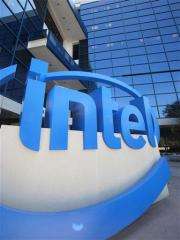
(AP) -- As the world's biggest maker of computer chips, Intel Corp. can't afford to ignore its huge blind spot in mobile phones.
Eighty percent of today's personal computers use Intel processors. But Intel is absent in smart phones, which are threatening PCs as gateways to the Internet. One reason is that Intel still doesn't have good ways to design chips to use less power, so Intel's products drain batteries more quickly - something smart-phone makers won't tolerate.
The dynamic has put Intel at risk of missing out on the next great opportunity for semiconductor companies. That is why Intel has decided to buy the wireless-chip division of Germany's Infineon Technologies AG for $1.4 billion. With it, Intel gets the chips used in Apple Inc.'s popular iPhone.
The all-cash deal, announced Monday, is an acknowledgment that Intel has missed the boat on mobile phones, and it gives the company an opportunity to correct its course.
The challenge is similar to the one Microsoft Corp. is facing with Google Inc. as software is increasingly being delivered over the Internet instead of being stored on PCs, the way Microsoft has long approached it. Like Microsoft, Intel is the undisputed leader in a market that's under attack from a fast-rising force from the outside.
Intel is trying to play catch-up before it falls too far behind.
Intel bought mobile software maker Wind River Systems for $884 million last summer, and the company has spearheaded development of the open-source Moblin software, which is designed to run on mobile devices that use Intel chips.
Two weeks ago, it announced plans to buy computer-security software maker McAfee Inc. for $7.68 billion, which would be the biggest acquisition in Intel's 42-year history once it gains the expected approvals.
As mobile phones become increasingly enticing targets for hackers, security companies have been developing ways to protect those devices. With McAfee, Intel would be able to bake security into its mobile chips - including those from Infineon.
But even as Infineon's products give Intel quick entry into the mobile-chip business, Intel is fighting its own history with the Infineon deal, which could prove to be a costly distraction. Many analysts aren't optimistic about Intel's chances, pointing to its spotty track record with acquisitions.
"We feel like we have seen this movie before," analyst Craig Berger with FBR Capital Markets wrote in a research note to investors.
Berger said Intel would gain a strong business with a "sizable presence" among big cell-phone makers and the expertise in building chips based on a low-power design that is widely used in cell phones.
However, he said he is skeptical of Intel's ability to execute outside of its core market, which is making microprocessors that act as the "brains" of PCs.
Intel had a division that made chips for smart phones, but sold it off four years ago in a round of cost-cutting. Since then, Intel has focused on its core business. Meanwhile, use of the Internet on mobile phones has exploded, and companies that make chips for phones have benefited from demand for more capable - and expensive - chips.
Phone chips need to sip power instead of guzzle it, and even Intel's energy-efficient designs are criticized as too power-hungry for today's smart phones. Phone makers need to make awkward contortions, such as building bigger devices, to accommodate the need for a bigger battery - which most are loath to do.
With an annual research-and-development budget of nearly $6 billion, Intel is equipped to pour incredible resources into essentially any chip project it chooses. After its exit from the mobile-phone chip market in 2006, it focused on other types of communications technologies. Buying its way back into the market is the fastest way for the company to make up for lost time.
David Perlmutter, an Intel executive vice president, said in an interview with The Associated Press that the decision to sell the mobile-chip business in 2006 was "the right decision at the time," and that Intel is buying a more complete lineup of technologies from Infineon than those available in the business it sold.
"I hope that we've learned our lessons and that we're way more focused," he said.
With Infineon, Intel would become the fifth-biggest supplier of mobile-phone processors if the deal closes as expected in the first quarter of next year.
It would get a running start in a market dominated by Qualcomm Inc., Texas Instruments Inc. and STMicroelectronics, which together own about half the total market for processors and other communications chips for cell phones, according to Gartner Inc.
Still, Intel would be a small player: the Infineon division owns only about 5 percent of the market.
Analyst Tristan Gerra with Robert W. Baird & Co. warned that the deal might be "too little, too late" for Intel's push into smart phones, and he said that Intel will have to invest heavily to keep Infineon's products competitive with the rollout of the next-generation cellular networks known as 4G.
One of the reasons that Intel's earlier mobile push failed is that it faced entrenched competitors that already had deep relationships with makers of cell phones. Those rivals also had significant investments in research and development in the area. Gerra and other analysts say Infineon is already at risk of losing its business with Apple because of more competitive products from rivals.
Gerra added that the mobile-phone business moves faster than the PC business.
"Whether a PC company such as Intel can move nimbly given more rapid new product cycles within the mobile-phone industry remains a significant question mark," he said.

Explore our curated content, stay informed about groundbreaking innovations, and journey into the future of science and tech.
© ArinstarTechnology
Privacy Policy